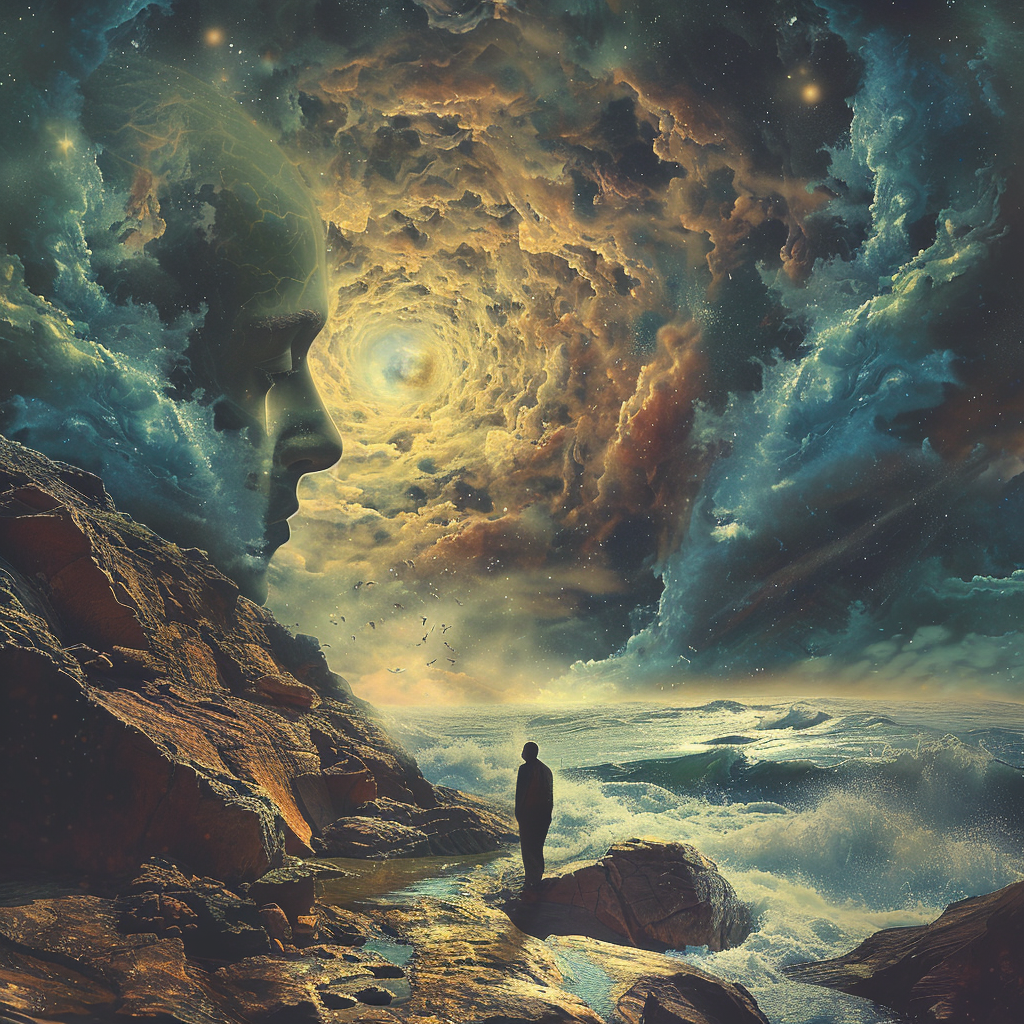
Let’s begin by stating the obvious, life is a psychic experience, not just the random happenstance of a deterministic universe unfolding according to physical law. There’s something else going on besides that because it’s a fact that life can only be experienced from within, within the psyche, within the mind, that spark of awareness that for all intents and purposes is a spiritual gift. Why do I call it a psychic experience as opposed to a material one, that’s because in order to experience anything at all we have to have a psyche, so whenever I say ‘psyche,’ I’m using the language of psychology, and psychoanalysis as pioneered by revolutionary thought leaders such as Carl Gustav Jung (1875-1961).
Who was Carl Jung?
Carl Gustav Jung was a Swiss psychiatrist and psychoanalyst who founded analytical psychology. Born on July 26, 1875, in Kesswil, Switzerland, and passing away on June 6, 1961, in Küsnacht, Switzerland, Jung made significant contributions to psychology, particularly through his exploration of the human psyche.
Early Life and Education
Jung was born into a religious family, with his father being a pastor. His early interest in philosophy, spirituality, and the sciences shaped his intellectual pursuits. He studied medicine at the University of Basel and later specialized in psychiatry at the University of Zurich. His work at the Burghölzli psychiatric hospital in Zurich brought him into contact with Eugen Bleuler, a prominent psychiatrist, which further influenced his career.
Relationship with Freud
Jung initially worked closely with Sigmund Freud, the founder of psychoanalysis. They corresponded extensively and collaborated on many projects, sharing an interest in the unconscious mind. However, their relationship eventually soured due to fundamental theoretical disagreements. While Freud emphasized the role of sexual drives in human psychology, Jung proposed a broader and more spiritual interpretation of the unconscious.
Key Contributions
Analytical Psychology: Jung developed analytical psychology as an alternative to Freud’s psychoanalysis. This school of thought emphasizes the exploration of the deeper layers of the psyche, including the personal unconscious and the collective unconscious.
Collective Unconscious: One of Jung’s most influential concepts is the collective unconscious, which posits that all humans share a set of memories and archetypes inherited from our ancestors. These archetypes, such as the Hero, the Mother, and the Shadow, are universal symbols that shape our experiences and behaviours.
Individuation: Jung introduced the process of individuation, which is the journey toward self-realization and psychological integration. He believed that individuation involves harmonizing the conscious and unconscious aspects of the psyche, leading to a more complete and balanced self.
Archetypes: Jung’s theory of archetypes includes innate, universal prototypes for ideas and characters that reside in the collective unconscious. These archetypes manifest in dreams, myths, art, and religion, reflecting the shared human experience.
Synchronicity: Jung also explored the concept of synchronicity, the idea that meaningful coincidences occur that are not causally related but hold significant personal meaning. He suggested that these events might reflect the interconnectedness of the psyche and the external world.
Psychological Types: Jung’s work on personality types laid the foundation for the Myers-Briggs Type Indicator (MBTI). He classified people based on dichotomies such as introversion versus extraversion, thinking versus feeling, and sensing versus intuiting.
Influence and Legacy
Jung’s work has had a profound impact on psychology, psychotherapy, literature, art, and spirituality. His ideas have influenced various fields, from clinical practice to creative expression. Jungian therapy, which involves exploring the unconscious and integrating its contents into conscious awareness, remains a widely practiced therapeutic approach.
In addition to his theoretical contributions, Jung’s extensive writings, including “Psychological Types,” “The Archetypes and the Collective Unconscious,” and “Memories, Dreams, Reflections,” have inspired generations of thinkers and practitioners. His interdisciplinary approach, blending psychology with philosophy, religion, and cultural studies, continues to resonate with those seeking to understand the complexities of the human psyche.
Overall, Carl Jung’s pioneering work and profound insights into the human mind have established him as one of the most influential figures in the history of psychology.
So, what are Jung’s thoughts on life being a psychic experience and what does that mean for us?
Life, from the perspective of analytical psychology, is seen as a process of personal growth and development. This journey is largely an inner experience, as it involves exploring and coming to terms with the contents of the psyche, which are often symbolic and have a strong emotional charge. As we navigate life, we encounter situations, relationships, and challenges that force us to delve into our subconscious minds and confront our psychological patterns, fears, desires, and conflicts.
It’s within the subconscious mind that all meaning is to be found, the subconscious or the deeper parts of the overall psyche that are not presented to our conscious awareness is a domain that holds a wealth of meaning and significance in the journey of self-discovery and understanding the human condition. The contents of the subconscious, that when explored, examined or analysed often contain symbols, archetypes, and archetypal motifs, that when studied often become sources of profound meaning unveiling insights about our individual existence and the universal human experience. The exploration and integration of these contents are crucial in providing a deeper understanding and sense of purpose in life.
So, what is the purpose of life?
According to Jung, the purpose of life is not fixed or universal, but rather it’s a journey of self-discovery and personal exploration. He believed that the primary task of life is the realisation and integration of the Self, or the totality of the Psyche, a process that involves becoming conscious of all aspects of the psyche and achieving a state of wholeness or individuation.
So, what is the Self?
According to Jung, the Self is a unifying concept in analytical psychology representing the totality of the psyche. It integrates the conscious and unconscious parts of the individual, including the ego (conscious self), shadow (repressed aspects), persona (social self), and anima/animus (opposing gender archetype within the unconscious). The Self can be seen as a guiding force towards wholeness and individuation, urging the individual towards greater self-awareness, inner balance, and integration of all aspects of the psyche.
For Jung, this process, involves acknowledging and reconciling the opposites within us, such as the conscious and unconscious, the rational and irrational, and the spiritual and material, the persona and the shadow, the anima or animus, making us a harmony of opposites. The Persona being our social self, made up of those aspects of our psyche that we show other people when we want to be liked, likewise, the Shadow or more correctly the Shadow Persona represents all of those things that we repress consciously or otherwise because they will detract from this.
The Anima represents the feminine side of a man’s psyche whilst the Animus is the masculine side of a woman’s psyche.
For example, if you’ve ever heard the oft repeated saying that men should get in touch with their feminine sides, that is a result of Jungian analytical psychology, because Jung’s concept of the anima/animus archetypes highlight the importance of recognising and dealing with the opposites within us. So, when we talk about men getting in touch with their feminine side, what’s really meant is acknowledging and accepting the feminine aspects within themselves, which may include qualities like emotionality, intuition, and receptivity. This helps to create a more balanced and whole sense of self. In a sense, we’re beings that are both male and female, persona and shadow, ego and self, all of which needs to be brought into conscious awareness, and as such made known to the ego that sits at the very centre of our psyche.
According to Carl Jung, the psyche of an individual is composed of many aspects or components representing different parts of our psychological makeup all of which must be integrated into the whole. This integration is a key step towards the realisation of the Self and the attainment of individuation.
In “Memories, Dreams, Reflections” Carl Jung wrote:
“The ‘Self’ is not only the centre but also the whole circumference which embraces both conscious and unconscious; it is the centre of this totality, just as the ego is the centre of consciousness. The ego is the subject and at the same time the centre of the field of consciousness; the self is the subject and at the same time the centre of the entire personality.”
The goal of individuation, according to Jung, is to develop a conscious and authentic self by transcending the ego-centred identity and accessing deeper layers of consciousness. It’s seen as a lifelong process that leads to psychological maturity, self-understanding, and spiritual development. This is your life’s purpose, or at least where it can be found.
“Your vision will become clear only when you can look into your own heart. Who looks outside, dreams; who looks inside, awakes.” –
Carl Jung
Letters, Volume 2 (Princeton University Press, 1973), p. 33

